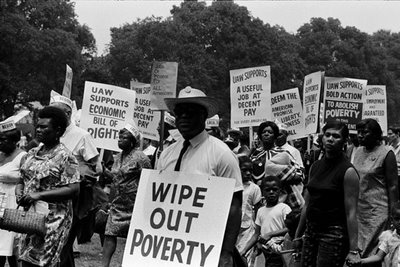Black versus white household income over the past 50 years

I outline here what ought to be the astounding fact that, more than a half century after the March on Washington, the Civil Rights Act, the Voting Rights Act, the creation of affirmative action, etc., America has achieved exactly zero progress in improving the economic status of African Americans relative to that of whites:
In 2015 — the most recent year for which data are available — black households at the 20th and 40th percentiles of household income earned an average of 55 percent as much as white households at those same percentiles. This is exactly the same figure as in 1967.
Indeed, five decades of household income data reveal a yawning and uncannily consistent income gap between black and white Americans across the economic spectrum. Fifty years ago, black upper-class Americans had incomes about two-thirds those of white upper-class Americans, while the black middle class — those in the 60th percentile — earned about two-thirds [note: this should be three-fifths] as much as its white counterpart. Those ratios remain the same today.
I also engage in some groundbreaking historical research, uncovering the previously unknown fact that Martin Luther King’s civil rights efforts were not limited to one speech in August of 1963:
It is important to remember the extent to which the civil rights movement led by the Rev. Dr. Martin Luther King Jr. was focused on economic injustice. Indeed, A. Philip Randolph and Bayard Rustin, who planned the March on Washington that culminated with Dr. King’s “I Have a Dream” speech, organized the event primarily to highlight and protest what they called “the economic subordination of the American Negro.”
And Dr. King’s Poor People’s Campaign, which he was organizing at the time of his murder, was an even more explicit argument that racial and economic justice are inextricably linked.
Still, leftists should avoid snark about white economic anxiety, which is just as real as racism:
None of this is intended to minimize the legitimate anxiety felt by white families at a time when wages for low-wage workers have declined and middle-class incomes have stagnated, even as the economy has boomed and upper-class incomes have soared. Between 1980 and 2014, the post-tax income of the bottom 50 percent of the population grew by 21 percent, while that of the top .01 percent grew by 424 percent.
But over that same time, black working- and middle-class households have seen their incomes stagnate in exactly the same fashion as those of their white neighbors — and from a base that was and thus remains little more than half as large.
A genuine populist movement would unite working- and middle-class Americans of all backgrounds, rather than dividing them by exploiting false beliefs about the supposed loss of white economic privilege.
